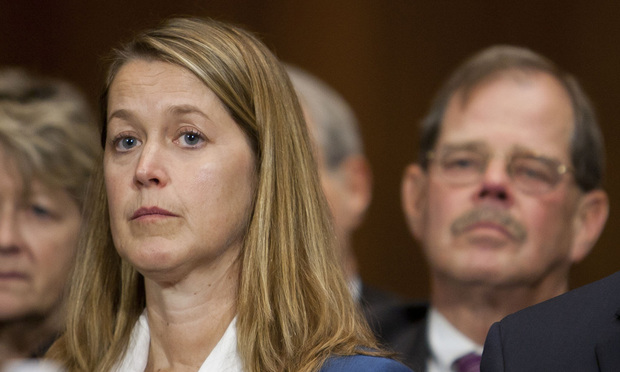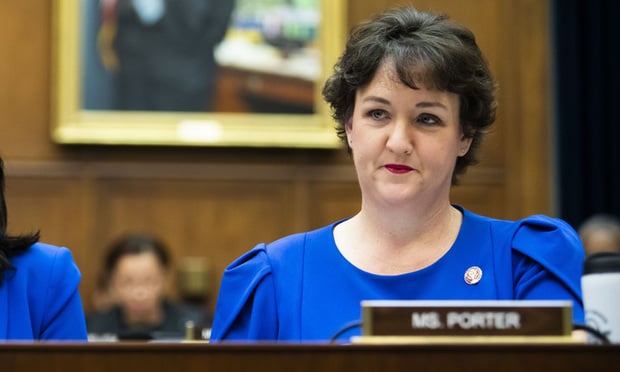Freshman Rep. Katie Porter Is the Talk of the Congressional Investigations Bar
Leading white-collar and congressional investigations lawyers had U.S. Rep. Katie Porter on their minds at an American Bar Association event this week in Washington.
March 20, 2019 at 05:53 PM
6 minute read
 Amy Jeffress (File: 2013) Credit: Diego M. Radzinschi / NLJ
Amy Jeffress (File: 2013) Credit: Diego M. Radzinschi / NLJ
Last month, Wilmer Cutler Pickering Hale and Dorr partner Reg Brown was watching as a freshman lawmaker from California rose overnight to national prominence.
In a round of questioning that would go viral, Democratic U.S. Rep. Katie Porter asked Equifax CEO Mark Begor to reveal his Social Security number and date of birth. When he declined, saying he'd be a “bit uncomfortable” providing that personal information, Porter brought the hammer down. Why then, she asked, were Equifax's lawyers arguing that the company's 2017 data breach caused no harm to consumers.
In that moment, Brown, who had prepared another executive for the hearing, saw the beginnings of a questioning style that put Porter firmly on the radar of the congressional investigations bar and any executive coming before the House Financial Services Committee.
“The idea that your own litigation filings might be harmful to you in the course of congressional hearings is something of a new twist,” Brown said Tuesday, appearing on an American Bar Association panel about defending clients in congressional investigations. “But we are where we are.”
Porter took a similar approach in her questioning of Wells Fargo CEO Tim Sloan earlier this month, opening her round with questions about whether the executive meant it when he said in the wake of the fraudulent account scandal that the bank was committed to restoring customers' trust. If that were the case, she asked, why were Wells Fargo's lawyers dismissing his statements in a securities class action as “paradigmatic examples of nonactionable corporate puffery, on which no reasonable investor could rely.” Sloan didn't have an answer.
 Rep. Katie Porter, D-California. Credit: Diego M. Radzinschi / NLJ
Rep. Katie Porter, D-California. Credit: Diego M. Radzinschi / NLJPorter's success landing blows at congressional hearings has made her the U.S. House equivalent of her former law school professor, U.S. Sen. Elizabeth Warren, D-Massachusetts, who has shown a similar approach in grilling financial industry executives.
Porter has set herself apart with a signature approach: using a company's own court filings against its top executive. At Tuesday's ABA panel, it was clear Porter has been on the minds of lawyers who are in the business of prepping executives for their time appearing in the klieg lights of a congressional hearing.
Arnold & Porter partner Amy Jeffress, speaking on Tuesday's panel, said white-collar defense lawyers have long been accustomed to considering how public testimony might affect a court proceeding. Porter's questioning style, rooted in her background as a law professor, has demonstrated a need to dig deeper during hearing prep, Jeffress said.
“This converse, of having what you say in litigation now brought into your congressional investigation context—that's new. That's a fresh perspective,” Jeffress said. “I think it's really interesting. Good for her for being so prepared and for thinking through it.
“It means that we all have to think ahead in that same way and think about what has a company been saying in litigation. It just means more preparation time, just more homework,” she added. “So good for lawyers—more business.”
MoloLamken partner Justin Shur moderated Tuesday's panel, which also included Akin Gump Strauss Hauer & Feld partners Karen Christian and Raphael Prober.
More highlights from the discussion:
>> “I see your five minutes is up.” At a February hearing with the House Judiciary Committee, then-acting Attorney General Matthew Whitaker drew gasps when he tried to enforce the five-minute limit on questioning rounds. “Mr. Chairman, I see your five minutes is up,” he told the committee's leader, U.S. Rep. Jerrold Nadler. “I'm here voluntarily. I agreed to five-minute rounds.”
The moment immediately became a highlight—or, more specifically, a blooper—in congressional hearings lore.
“I keep a newsreel of real doozies. And I show them to my clients and say to them, 'Don't be him, don't be her.' And there have been some great additions lately,” Brown said, giving Whitaker's “five minutes are up” remark as an example.
Generally, Brown said, “witnesses are more prepared now than in the past, and that's partly due to the more professionalized bar in this space.” The Senate Finance Committee's recent hearing on drug pricing, he said, featured several pharmaceutical industry executives who were all “really well-polished, prepared.” Brown said of the CEOs: “Not a single one of them missed a beat.”
>> Closed-door v. public hearing: Is there a preference? “I think you can do a lot less at a hearing than you can in a closed-door session. … At a hearing, the members generally don't want to see the lawyers jumping up and down helping their clients. And it doesn't look good, especially if it's televised,” Jeffress said.
She added: “Generally, a closed-door session is preferable because there are fewer members there performing for the cameras. You can have a more civilized engagement and often the members don't even come. I think it's a more comfortable situation. It's still a hot seat, but it's much less so than being in the hearing room.”
>> To attend the hearing or not to attend? “I used to go to all the hearings. And now, I kind of feel like if I've done my work well, the general counsel can sit behind the witness,” Wilmer's Brown said. “There really isn't anything to do other than be supportive, because there's not much of an opportunity to weigh in. If there's a problem where there's something inaccurate on the record, the record is usually open for a while. You can address it after the hearing.”
Read more:
'I Don't Want My Client to Be Blindsided': Lawyers Brace for Rep. Porter's Questions
'Your Five Minutes Is Up,' Matt Whitaker Tells Leading House Democrat
Compliance Hot Spots: When a Law Professor Goes to Congress
How a 'Never Trump' Covington Partner Won, Then Lost, Lucrative ZTE Monitorship
Many Women Lawyers Were Elected in the Midterms? Here's Who They Are
This content has been archived. It is available through our partners, LexisNexis® and Bloomberg Law.
To view this content, please continue to their sites.
Not a Lexis Subscriber?
Subscribe Now
Not a Bloomberg Law Subscriber?
Subscribe Now
NOT FOR REPRINT
© 2025 ALM Global, LLC, All Rights Reserved. Request academic re-use from www.copyright.com. All other uses, submit a request to [email protected]. For more information visit Asset & Logo Licensing.
You Might Like
View All
SEC Official Hints at More Restraint With Industry Bars, Less With Wells Meetings
4 minute read
CFPB Resolves Flurry of Enforcement Actions in Biden's Final Week

Wells Fargo and Bank of America Agree to Pay Combined $60 Million to Settle SEC Probe
Trending Stories
Who Got The Work
J. Brugh Lower of Gibbons has entered an appearance for industrial equipment supplier Devco Corporation in a pending trademark infringement lawsuit. The suit, accusing the defendant of selling knock-off Graco products, was filed Dec. 18 in New Jersey District Court by Rivkin Radler on behalf of Graco Inc. and Graco Minnesota. The case, assigned to U.S. District Judge Zahid N. Quraishi, is 3:24-cv-11294, Graco Inc. et al v. Devco Corporation.
Who Got The Work
Rebecca Maller-Stein and Kent A. Yalowitz of Arnold & Porter Kaye Scholer have entered their appearances for Hanaco Venture Capital and its executives, Lior Prosor and David Frankel, in a pending securities lawsuit. The action, filed on Dec. 24 in New York Southern District Court by Zell, Aron & Co. on behalf of Goldeneye Advisors, accuses the defendants of negligently and fraudulently managing the plaintiff's $1 million investment. The case, assigned to U.S. District Judge Vernon S. Broderick, is 1:24-cv-09918, Goldeneye Advisors, LLC v. Hanaco Venture Capital, Ltd. et al.
Who Got The Work
Attorneys from A&O Shearman has stepped in as defense counsel for Toronto-Dominion Bank and other defendants in a pending securities class action. The suit, filed Dec. 11 in New York Southern District Court by Bleichmar Fonti & Auld, accuses the defendants of concealing the bank's 'pervasive' deficiencies in regards to its compliance with the Bank Secrecy Act and the quality of its anti-money laundering controls. The case, assigned to U.S. District Judge Arun Subramanian, is 1:24-cv-09445, Gonzalez v. The Toronto-Dominion Bank et al.
Who Got The Work
Crown Castle International, a Pennsylvania company providing shared communications infrastructure, has turned to Luke D. Wolf of Gordon Rees Scully Mansukhani to fend off a pending breach-of-contract lawsuit. The court action, filed Nov. 25 in Michigan Eastern District Court by Hooper Hathaway PC on behalf of The Town Residences LLC, accuses Crown Castle of failing to transfer approximately $30,000 in utility payments from T-Mobile in breach of a roof-top lease and assignment agreement. The case, assigned to U.S. District Judge Susan K. Declercq, is 2:24-cv-13131, The Town Residences LLC v. T-Mobile US, Inc. et al.
Who Got The Work
Wilfred P. Coronato and Daniel M. Schwartz of McCarter & English have stepped in as defense counsel to Electrolux Home Products Inc. in a pending product liability lawsuit. The court action, filed Nov. 26 in New York Eastern District Court by Poulos Lopiccolo PC and Nagel Rice LLP on behalf of David Stern, alleges that the defendant's refrigerators’ drawers and shelving repeatedly break and fall apart within months after purchase. The case, assigned to U.S. District Judge Joan M. Azrack, is 2:24-cv-08204, Stern v. Electrolux Home Products, Inc.
Featured Firms
Law Offices of Gary Martin Hays & Associates, P.C.
(470) 294-1674
Law Offices of Mark E. Salomone
(857) 444-6468
Smith & Hassler
(713) 739-1250









